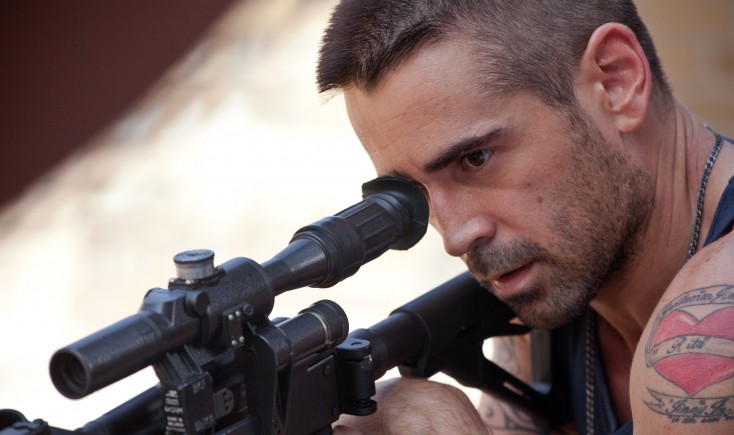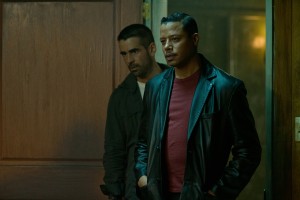Front Row Features
HOLLYWOOD—Colin Farrell has played his share of hit men with a heart. Remember “In Bruges?” The Irish actor again plays an assassin with a conscience in the drama “Dead Man Down,” directed by Niels Arden Oplev, who helmed the original “Girl With the Dragon Tattoo.”
A divorced father of two, Farrell plays Victor, a Hungarian immigrant working for a ruthless mobster in New York. As the story unfolds, the audience discovers his tragic background and what has led him to a life of crime… and his ulterior motive. He co-stars alongside Noomi Rapace, the Swedish actress who starred in Oplev’s “Tattoo.” She plays a neighbor who blackmails the hit man into an act of vengeance as he hatches his own act of revenge.
Sporting an unexplained samurai hairstyle (shaved on the sides with the top pulled back in a topknot), Farrell, 36, talked about his latest crime drama. He also recently wrapped his part in the drama “Saving Mr. Banks,” in which he plays the father of a P.L. Travers, an Australian who grew up to write “Mary Poppins.”
He also spoke about his surprising secret wish: to star in a romantic comedy.
Q: Have you ever met somebody like Victor?
Farrell: Like my guy? I may have, but if I met him I wouldn’t know. I don’t think so.
Q: I mean have you ever met a pretty neighbor as Victor does?
Farrell: I have a 65-year-old neighbor, who lives across the way but he’s not as pretty as Noomi. (He chuckles.) He’s a surgeon so he wears his scrubs into the garden and does his gardening and picks his fruit. It’s quite funny. Where I grew up, I lived in a place that was not something that lent itself to voyeurism as much as the geography between our two characters in this does.
Q: It seems like there wouldn’t be room for romance for someone like Victor, who is consumed by hate and revenge. Or is there only room for romance in Victor’s life?
Farrell: There must be. He’s somebody who has been so cruelly carved by the experience that has been afflicted upon him, but the path towards vengeance and the path towards retribution is one that in the male part of his brain and the habitual part of his being is a path that seems to make sense. It’s a path that lends itself to what seems right and a notion of justice. A thing fundamentally inside of me understands that there is no righting the scales of justice in this one. There is no bringing anyone back. There is no closure. There is no completion of the circle and I think, fundamentally, he’s a good enough man. He’s a solid enough human being that he sees that it doesn’t work and he’s still going about it and he’s very clinical about it. Whether he knows it or not, he’s delaying (exacting revenge). This actually gives him something to live for and if he does bring down the gang, then there’s no purpose left in his life at all.
Q: You looked cold in the movie. Did you shoot this in New York in the winter?
Farrell: I think it went from winter into spring. I think I remember it being beautiful there as well. It wasn’t too cold. I just got back from New York. I was there for five months recently so when I hear cold, that’s where my head goes.
Q: You had three days of rehearsals, right?
Farrell: I can’t remember. Were we even spoiled even that much? It was fairly quick from the time we got there to the time we started shooting. But all the actors and scenes were ready to go and prepared, from Terrence (Howard, who plays Victor’s boss) to Dominic (Cooper, who plays a fellow assassin) to Noomi—they all had very distinct ideas of what they were doing on the film. The film—elements of it are very middle-of-the-road, genre, gangster, revenge, violent film—but the thing that that was significantly different about the script from others I’ve read before was the relationship between Noomi’s character and my character. It kind of felt like a diamond in the rough. The film kind of felt a little bit like “Bonnie and Clyde.” These two characters don’t start out together and they spend the majority of the film not together in a romantic sense. They do kind of complete each other in many ways and each can only find a way out of the violence that they’ve carved as the modus operandi of their lives, the Opus Dei of their lives, through each other. Each kind of evokes a sense of vulnerability in the other that was kind of suppressed. The coolest element was how they lived—in the apartments across from each other. There was something that bordered on the Hitchcockian to it, and I like that contrivance very much. I just thought there was a certain poetry to that as well that I don’t know if we explored as much in the film as we could have.
Q: Did Noomi teach you any Swedish?
Farrell: She did but I’ve forgotten it. It wouldn’t have been appropriate. (He chuckles.)
Q: Have there been characters in the past that are harder to let go of more than others?
Farrell: Sure. “Horrible Bosses” wasn’t hard to let go. Just take the bald cap off and that’s it. “Fright Night” wasn’t really hard. Some of them stay with you more than others for sure. “Alexander” stayed with me. I nearly lost my mind in that one. This one, I had such a wonderful time, particularly working with Noomi. Every beat, every step that she made that I had the honor to respond to, and vice-versa. The subject matter was dark enough and none of the characters are having a good time and the only time that a bit of light comes through is the very end, like the last frame of the film almost. Some characters I find you get tired of playing sooner than others and you get to an understanding of what the character is at whatever stage that you do. When you walk into a film and begin a film as an actor, I don’t think you completely understand a character. You understand a version and hopefully have a keen concept of what the character is, but until you start really living in front of the camera, you don’t really garner the world of the character. After six weeks (on this) I was like, “oh (great), I get it.” It’s two hours and you go, “oh yeah,” but on week six it’s all so heavy. That’s the worst part of my job.
Q: We’re not used to seeing you play a weak character, but in “Saving Mr. Banks,” you do. Travers Robert Goff is kind of a loser, isn’t he?
Farrell: I don’t know if he’s a loser. He’s a man who as a result of having a romantic wanderlust can’t feel the gifts that are very present in his life every day. As so many people do, he has everything he needs to be happy but the condition and the temperament to feel what he knows he has and he’s a raging alcoholic and he’s a dreamer. He loses his job, and (the family) moves from town to town to town. So he’s probably, in urban vernacular, “a loser,” but he’s one of those people that tried his best but couldn’t … do it. He tried his best but couldn’t be a dad.
Q: How was the experience of doing it?
Farrell: So beautiful. I got to work with Ruth Wilson, and Ruth was fantastic and then Annie Buckley who plays a young Emma Thompson. So I play Emma Thompson’s dad in flashback, and her and Tom Hanks exist in the same era. It was a really wonderful experience. It was one of the most beautiful scripts for me, personally, that I’ve read in 15 years. Just the sense of magic, the sense of wonder, the sense of a childhood curiosity and also the sense of fatigue, that the years and the loss and regret can bring and the expression of all those things through art, however in a cloaked manner through a lot of her personal experience. A lot of people think it’s a sweet story about a nanny, and it is, but there’s a subversive element to it as well.
Q: You’ve played lots of roles over the past 13 years. What appeals to you now that you wouldn’t have been ready or taken when you were starting out?
Farrell: Light appeals to me more when I look at the choices. Where that’s represented is (my next film) “Ms. Julie.” Yeah, that’s a really light piece of work. But I do think light appeals to me more. Concepts that I’ve gripped or held onto that one has to struggle to create art, I don’t believe anymore. I understand why someone would believe that being someone who did but in the experience of the expression of both ways of telling a story, I don’t think it’s true. I wouldn’t mind doing a romantic comedy like a good one as opposed to a (bad) one, but I really would if I found something that was fun and smart and witty and not just insulting to the idea of romance. I’d love to do that, different stuff.






